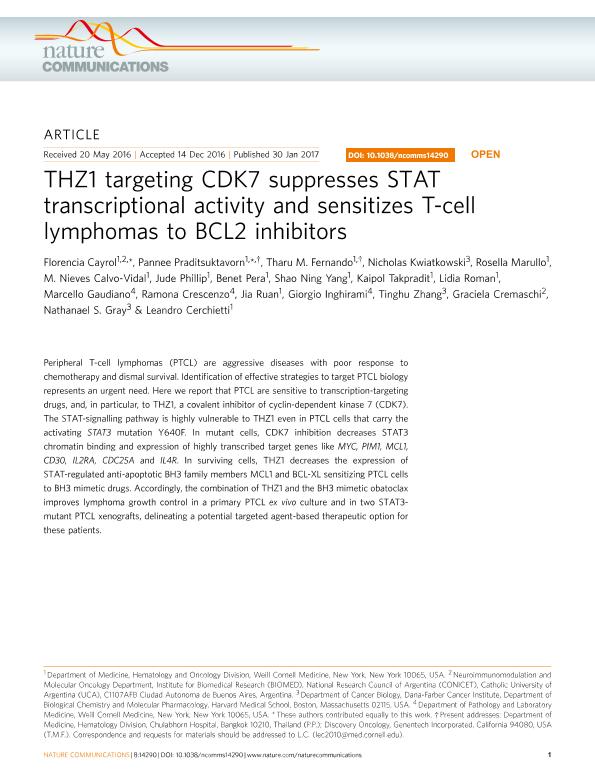Artículo
THZ1 targeting CDK7 suppresses STAT transcriptional activity and sensitizes T-cell lymphomas to BCL2 inhibitors
Cayrol, Maria Florencia ; Praditsuktavorn, Pannee; Fernando, Tharu M.; Kwiatkowski, Nicholas; Marullo, Rosella; Calvo Vidal, M. Nieves; Phillip, Jude; Pera, Benet; Yang, Shao Ning; Takpradit, Kaipol; Roman, Lidia; Gaudiano, Marcello; Crescenzo, Ramona; Ruan, Jia; Inghirami, Giorgio; Zhang, Tinghu; Cremaschi, Graciela Alicia
; Praditsuktavorn, Pannee; Fernando, Tharu M.; Kwiatkowski, Nicholas; Marullo, Rosella; Calvo Vidal, M. Nieves; Phillip, Jude; Pera, Benet; Yang, Shao Ning; Takpradit, Kaipol; Roman, Lidia; Gaudiano, Marcello; Crescenzo, Ramona; Ruan, Jia; Inghirami, Giorgio; Zhang, Tinghu; Cremaschi, Graciela Alicia ; Gray, Nathanael S.; Cerchietti, Leandro
; Gray, Nathanael S.; Cerchietti, Leandro
 ; Praditsuktavorn, Pannee; Fernando, Tharu M.; Kwiatkowski, Nicholas; Marullo, Rosella; Calvo Vidal, M. Nieves; Phillip, Jude; Pera, Benet; Yang, Shao Ning; Takpradit, Kaipol; Roman, Lidia; Gaudiano, Marcello; Crescenzo, Ramona; Ruan, Jia; Inghirami, Giorgio; Zhang, Tinghu; Cremaschi, Graciela Alicia
; Praditsuktavorn, Pannee; Fernando, Tharu M.; Kwiatkowski, Nicholas; Marullo, Rosella; Calvo Vidal, M. Nieves; Phillip, Jude; Pera, Benet; Yang, Shao Ning; Takpradit, Kaipol; Roman, Lidia; Gaudiano, Marcello; Crescenzo, Ramona; Ruan, Jia; Inghirami, Giorgio; Zhang, Tinghu; Cremaschi, Graciela Alicia ; Gray, Nathanael S.; Cerchietti, Leandro
; Gray, Nathanael S.; Cerchietti, Leandro
Fecha de publicación:
01/2017
Editorial:
Nature
Revista:
Nature Communications
ISSN:
2041-1723
Idioma:
Inglés
Tipo de recurso:
Artículo publicado
Clasificación temática:
Resumen
Peripheral T-cell lymphomas (PTCL) are aggressive diseases with poor response to chemotherapy and dismal survival. Identification of effective strategies to target PTCL biology represents an urgent need. Here we report that PTCL are sensitive to transcription-targeting drugs, and, in particular, to THZ1, a covalent inhibitor of cyclin-dependent kinase 7 (CDK7). The STAT-signalling pathway is highly vulnerable to THZ1 even in PTCL cells that carry the activating STAT3 mutation Y640F. In mutant cells, CDK7 inhibition decreases STAT3 chromatin binding and expression of highly transcribed target genes like MYC, PIM1, MCL1, CD30, IL2RA, CDC25A and IL4R. In surviving cells, THZ1 decreases the expression of STAT-regulated anti-apoptotic BH3 family members MCL1 and BCL-XL sensitizing PTCL cells to BH3 mimetic drugs. Accordingly, the combination of THZ1 and the BH3 mimetic obatoclax improves lymphoma growth control in a primary PTCL ex vivo culture and in two STAT3-mutant PTCL xenografts, delineating a potential targeted agent-based therapeutic option for these patients.
Palabras clave:
Cdk7
,
Bcl2
,
T Cell Lymphoma
Archivos asociados
Licencia
Identificadores
Colecciones
Articulos(OCA HOUSSAY)
Articulos de OFICINA DE COORDINACION ADMINISTRATIVA HOUSSAY
Articulos de OFICINA DE COORDINACION ADMINISTRATIVA HOUSSAY
Citación
Cayrol, Maria Florencia; Praditsuktavorn, Pannee; Fernando, Tharu M.; Kwiatkowski, Nicholas; Marullo, Rosella; et al.; THZ1 targeting CDK7 suppresses STAT transcriptional activity and sensitizes T-cell lymphomas to BCL2 inhibitors; Nature; Nature Communications; 8; 1-2017; 1-11
Compartir
Altmétricas



